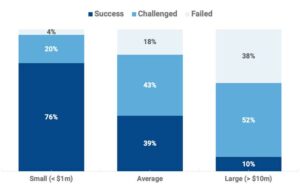The ability to make the right decisions is a game-changer. Whether it’s in your personal life or the business world, sound choices significantly impact your success. If decision-making is not your strong point, don’t worry! It is a skill you can develop and refine over time. To help you stay on track, we’ve developed this comprehensive 12-step guide to help you make better decisions.

1–Clarify Your Goals
Before diving into any decision, take the time to understand your goals thoroughly. Be clear about both your short-term and long-term objectives. Prioritizing these goals will help you remain focused throughout the decision-making process, ensuring you focus on what truly matters.
2–Gather Information
Information is power. Collect relevant data and facts related to the decision at hand. A well-informed decision is a more robust decision.
3–Identify Options
Embrace creativity by brainstorming and identifying multiple potential options. Resist the urge to rush into decisions; instead, explore a diverse range of possibilities.
4–Evaluate the Pros and Cons of Each Option
Take a close look at each option, assessing the advantages and disadvantages. Consider both immediate and long-term consequences, along with potential risks and benefits.
5–Consider Your Values
Reflect on your core values and principles. Ensure that the options align with your beliefs and ethics, ensuring your decisions are in harmony with who you are.
6–Seek Input and Feedback
Consult with a diverse group of people—friends, colleagues, mentors, and experts. Their unique perspectives provide valuable insights and ideas you might overlook.
7–Avoid Rushing
Resist the temptation to make hasty decisions, especially when dealing with significant choices. Give yourself the time to carefully weigh your options.
8–Use a Decision-Making Framework
Leverage a decision-making framework that suits the complexity of your situation. Consider tools such as a pros and cons list, decision matrix, or SWOT (strengths, weaknesses, opportunities, and threats) analysis.
9–Trust Intuition
While data-driven analysis is vital, don’t dismiss your intuition. Sometimes, your gut feeling can offer valuable guidance when data alone is inconclusive.
10–Learn from Past Decisions
Reflect on your previous decisions, both successful and not-so-successful. Analyze what worked and what didn’t, using this knowledge to continuously improve your decision-making skills.
11–Learn to Accept Uncertainty
Accept that you cannot make all decisions with absolute certainty. Be ready to take calculated risks when necessary and build resilience to handle unexpected outcomes.
12–Implement and Evaluate
Once you’ve made a decision, take prompt action. Procrastination can erode the effectiveness of even the best choices. After implementation, continuously evaluate the results. Did your decision achieve the desired outcomes? If not, be willing to adjust or change course.
Remember, there is no one-size-fits-all approach to decision-making. Each decision is unique, and the steps you follow may vary depending on the complexity of the situation. Decision-making is a lifelong skill, and continuous learning and refinement will lead to more effective choices over time.
The Costs of Poor Decisions
While you strive to make better decisions, it’s essential to recognize the potential costs of poor choices. Making bad decisions can have significant consequences, including:
- Financial Costs: Overspending, risky investments, and excessive debt without a clear plan for repayment
- Time and Opportunity Costs: Missed opportunities and inefficient use of time
- Damage to Relationships: Betraying trust, harming others, or failing to consider the impact of your actions
- Health and Well-being Costs: Adverse effects on physical and mental health
- Reputation Damage: Harm to the perception of your personal and professional character
- Legal Consequences: Fines, penalties, or imprisonment
- Emotional and Psychological Costs: Stress, anxiety, guilt, and regret
- Strain on Personal Growth: Hindrance to personal growth and development
- Impact on Long-Term Goals: Derailment of progress toward long-term aspirations
- Social and Environmental Costs: Broader societal and environmental impacts
Remember, everyone makes mistakes and poor decisions from time to time. The key is to learn from your experiences, turning them into opportunities for growth and improvement. By developing better decision-making skills and seeking advice when needed, you can mitigate the costs of bad decisions and enhance your overall decision-making outcomes.
Clear iQ’s Approach to Data-Driven Decisions
Clear iQ specializes in helping business executives increase the probability of making the right decisions. Our obsession with fact-based decision-making requires a disciplined approach. We follow the following method to facilitate the process:
- Identify the Problem: Make sure you are solving the problem and not the symptom.
- Determine Data Requirements and Availability: What facts will help support the decision process?
- Develop Decision-Making Criteria: Which inputs will influence and determine the decision-selection
- Match Data Against Criteria: Which facts are required to increase the probability of the right decision?
- State Hypothesis: What do you believe is the right solution, and how do you prove or disprove it?
- Conduct Benchmark and Analysis: Analyze the hypothesis and discover new perspectives that establish an accurate baseline to measure the effectiveness of the decision selected.
- Draw Conclusions: What conclusions can you draw, and which viewpoints do you not know?
- Make Decisions: Present the facts and interpretation of the facts to facilitate a solution with the highest probability of success.
- Monitor Results: Continuously monitor the results and actively apply course corrections.








